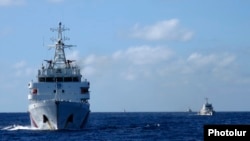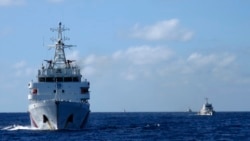“U.S. alliances [in Asia] have served as the foundation for regional peace and security, providing the environment for countries to prosper and resulting in some of the world’s most remarkable growth stories, from China to South Korea to countries across Southeast Asia,” U.S. Deputy Assistant Secretary for East Asian and Pacific Affairs Michael Fuchs said recently at the Annual South China Sea Conference in Washington, DC.
Even as the U.S. has been essential to peace and prosperity in the Asia-Pacific region, it is seizing on new opportunities through trade deals such as the Trans-Pacific Partnership, and the bilateral investment treaty negotiations with China that would bring even greater dynamic economic growth across the region. Nonetheless, growing provocative actions, increased military spending, strident nationalism, and rehashing of painful history make up a combustible mix that threatens the region’s stability and its future prosperity.
“These challenges highlight the need to strengthen the transparent, rules-based order and institutions that have helped the region thrive for decades,” Deputy Assistant Secretary Fuchs said. “Everyone has benefited from this order, and everyone can continue to benefit, if we work together.”
The tensions arising from competing territorial and maritime claims in the South China Sea are a key test of the region’s institutions and their ability to uphold international law and resolve disputes peacefully.
“We believe strongly that ASEAN and other regional institutions such as APEC are the key forums where countries can have frank and open discussions about the region’s most concerning challenges, come together to forge solutions, and build habits of cooperation,” Mr. Fuchs said.
The situation in the South China Sea is complex. Six claimants, plentiful fisheries and potential hydrocarbon reserves, the growing presence of maritime law enforcement vessels, and hundreds of geographic features make for a dynamic situation.
“Everyone inside and outside the region stands to lose if rules are devalued, dialogue breaks down, misreadings and misinterpretations multiply, and tensions spiral,” Deputy Assistant Secretary Fuchs said. “It’s high time for the region to have a robust discussion on tangible ways to de-escalate the current dispute.”
Mr. Fuchs recommended that claimant states ”freeze” activities that could escalate the disputes or cause instability. Claimants agreed to refrain from provocative activities in the 2002 Declaration on Conduct in the South China Sea, so clarifying and committing to “freeze” escalatory actions would help lower tensions and set the stage for a more permanent resolution.


















